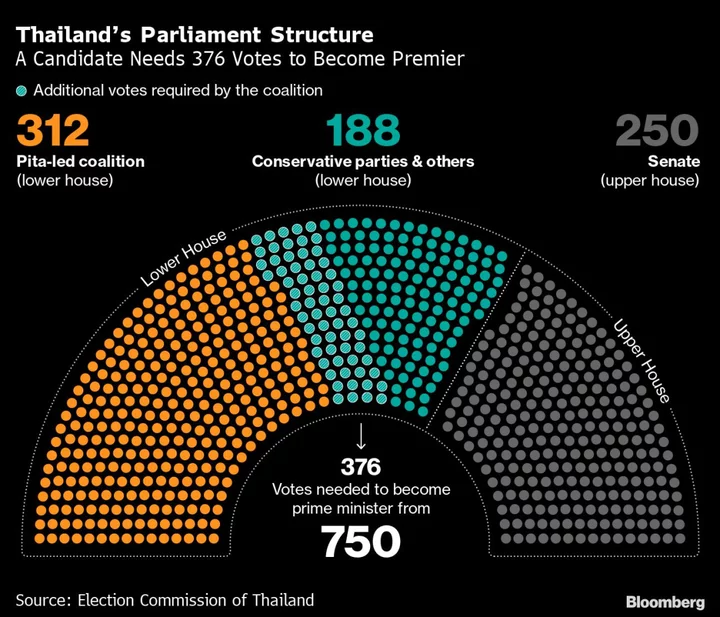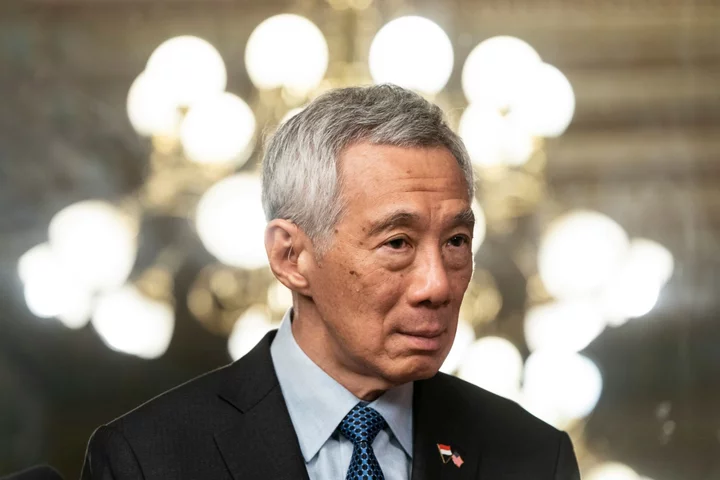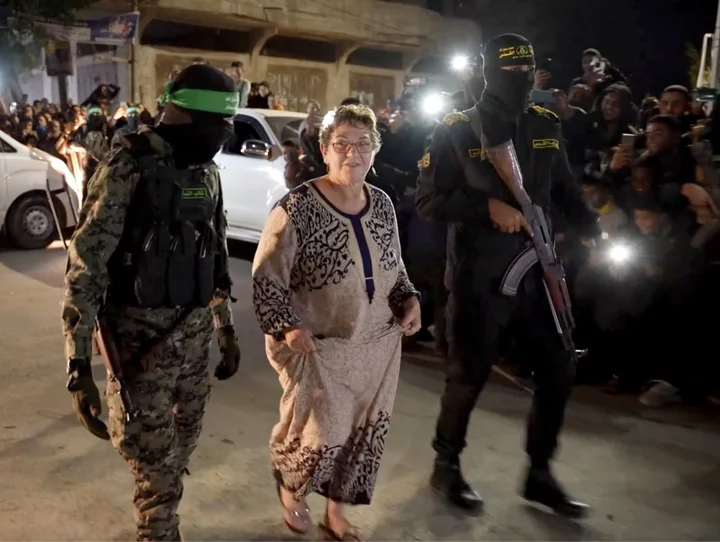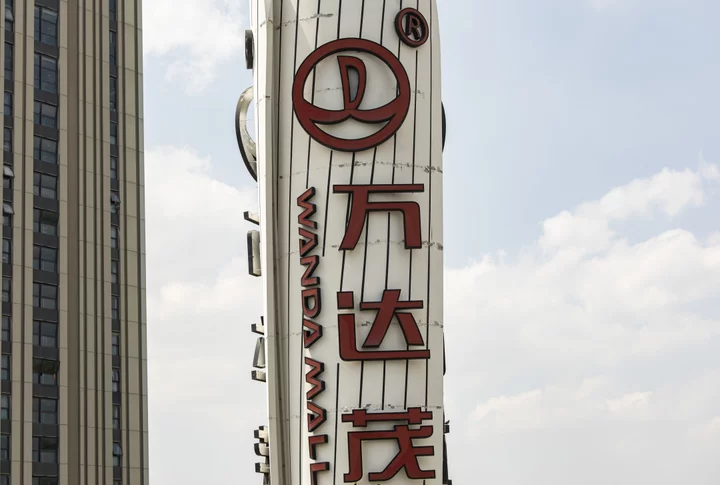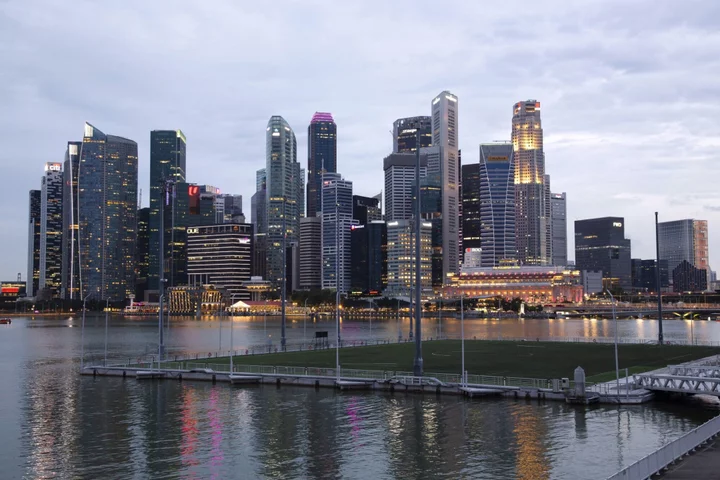Ever since Pita Limjaroenrat led his Move Forward Party to a surprise first-place finish in Thailand’s election last month, he’s faced a flurry of legal complaints and controversies challenging his bid to take power after more than a decade of military-backed rule.
Now with parliament scheduled to convene July 3 and lawmakers expected to vote on a new prime minister in the days or weeks afterward, time is running out for the 42-year-old leader to make sure his victory was anything other than symbolic.
Pita’s biggest challenge remains the 250-member Senate — a body appointed by the royalist military establishment following a 2014 coup, many of whose members oppose his proposal to ease penalties for criticizing the royal family. And they apparently don’t care that he won the most votes.
“It’s not our job to listen to the people,” Senator Prapanth Koonmee, a lawyer who said 90% of lawmakers in the upper chamber have already made up their mind, said in an interview. “Even if you got 100 million votes, I still wouldn’t pick you if I don’t like you or find you suitable.”
That hasn’t slowed down the Harvard-educated Pita. He’s built support from a range of pro-democracy parties since the vote and traversed the country seeking to sustain enthusiasm for the May 14 election results, which amounted to a shocking blow to the royalist establishment.
The stakes are high ahead of the parliamentary vote, expected soon after King Maha Vajiralongkorn opens parliament next week. A failure by Pita to get enough support could mean the unraveling of his coalition or even rule by a minority-led government.
Pita also needs to settle the growing fissures between his Move Forward Party and Pheu Thai, the second-largest group in the coalition, over the position of house speaker. The parties abruptly canceled previously planned meetings this week until they settled the differences.
The uncertainty has Thailand’s markets and global investors on edge. The nation’s main stock index is the worst performer in Asia this year, having tumbled about 11%, and was headed for its lowest close since early 2021. The baht slid to a seven-month low on Wednesday, extending losses to 2.3% since the election.
Read More: Here’s How Thailand’s PM Race Could Play Out as Talks Drag On
Pita has downplayed the uncertainty and sought to reassure supporters that he will lead the next government. That outreach has included meetings with various business groups, where he talks about the transition of power and the agenda for his first 100 days in office.
“We’re working hard to break the wall and forge an understanding between the two chambers,” Pita said at Parliament House on Tuesday. “There is constant progress.”
He added that he’s confident there will be enough support — he currently needs 64 senators — for him to be prime minister.
“Pita seems to be trying to create a sense of momentum and inevitability about him becoming prime minister, in the hope of putting pressure on senators to back him,” said Peter Mumford, the Southeast Asia practice head of consultancy Eurasia Group. “It is far from certain that the strategy will work, though.”
His performance as a prime minister-in-waiting has helped energize Move Forward’s supporters, who have pressured senators in online campaigns, public panels and street demonstrations to declare their support for Pita. But the voices run the risk of falling on deaf ears, as many senators have remained silent or publicly ruled out their support.
READ: Thai Coalition Says Nearing Senate Nod for Pita Premiership (3)
For many senators, resistance to Pita’s leadership is based largely on Move Forward’s platform to amend the lese majeste law, or Article 112 of the Thai criminal code, which penalizes criticisms against the king and other royals.
“Senators don’t like his disloyalty to the monarchy and his plans to reform and uproot Thai society,” said Senator Prapanth, 69. “It’s not acceptable.”
Pita has denied allegations that he is disloyal, saying he seeks to improve the relationship between the monarchy and the people.
Prapanth’s remarks underscore just how high the odds are stacked against Pita and his pro-democracy coalition. Yet with Move Forward previously ruling out alliances with conservative parties, there is little alternative but to win over as many senators as possible.
Behind the scenes, Move Forward has deployed top officials to approach individual senators — and even relied on a network of allies who are friends and families of lawmakers to make the party’s case.
“We’re trying whatever method is required to communicate with as many senators as possible,” said Parit Wacharasindhu, the party’s policy campaign manager, who is also one of the negotiators doing the outreach.
One of their strategies has been to argue that senators should vote for Pita not because they agree with him but for the same reason they cited in voting for incumbent Prime Minister Prayuth Chan-Ocha in 2019: because he had the support of the majority of the lower house.
Parit noted that hopes are higher for a group of 63 senators who previously voted for a failed measure to abolish the Senate’s power to vote for prime minister and limit it to the 500-member lower house. Parit said he’s confident he can win those senators over, then go for others.
“I still hope that senators will make decisions based on rational grounds, regardless of emotion and personal preferences,” Parit said.
One lawmaker in the Pita camp is Senator Zakee Phithakkumpol, a 45-year-old academic who considers himself a minority in the upper chamber. Zakee said he occasionally shares his views privately with those who oppose Pita in hopes of changing their minds. He also helped advise Move Forward negotiators who approached him on how best to address the senators’ concerns, he said.
“I tried to communicate with the elder senators that I’m not taking Pita’s side but the way we’re carrying on may not be good in the long term, especially if we want the monarchy to endure in Thai society,” Zakee said in an interview.
Zakee, who backed Prayuth in 2019, said he believes that abiding by democratic principles is the only way to prevent chaos.
“Thai society is at a crossroads between change and delaying it,” he said. “Your choice will upset some people either way, so what’s more important is to respect the rules. I believe that doing the right thing will protect you.”
--With assistance from Anuchit Nguyen and Margo Towie.
(Updates delay in coalition talks, market reaction from seventh paragraph.)

